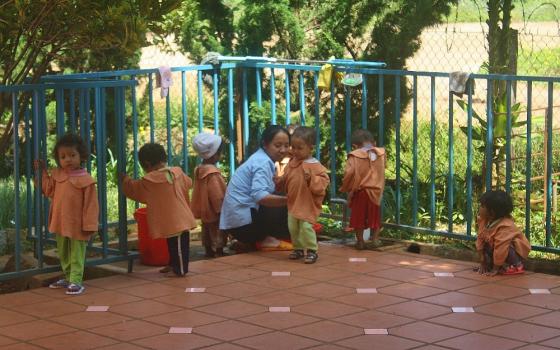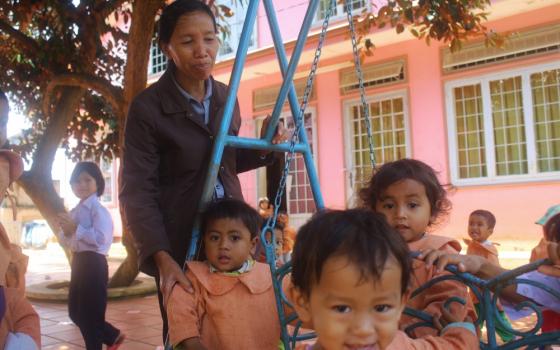A rough and rocky road winds through the hills from Dalat, through the pine forests of Vietnam’s Central Highlands dotted with wild flowers and farms where coffee and tea are grown. This dusty winding road goes to the Ta Nung Commune and is only 20 km long, but it takes people nearly 40 minutes to get there by motor scooter.
My motorbike taxi driver tells me, “You could imagine how dangerous traveling on this road to the commune was a decade ago.”
The commune is home to Cil, K’hor and Lach ethnic groups. They live in shabby houses and work on farms and collect vegetables from the forests to eke out their meager living. Its population is some 4,000 residents, including 1,000 Catholics.
Over 20 years ago two nuns of the Servants of the Holy Spirit volunteered to move there and live among the locals to help them. Cut off with few connections to civilized society, the people struggled with dire poverty and suffered from starvation and malaria.
One of the nuns, Sr. Anna Nguyen Thi Khoe, said she and her colleague teach people how to read and write, offer them faith education, and give them material support, health care, and ways to improve their hygiene. These services are the most basic aspects of Christian evangelization: to treat people with dignity – to offer people the skills they need to consistently maintain the basics of life – food, clothing and shelter. Someone who can read also has a better opportunity to change their life.
Sr. Khoe, a former elementary teacher, said ethnic minority women get married early and many have three children by the time they reach the age of 18, which in Vietnam is the legal minimum age to marry. Families typically have four to 12 children.
Out of necessity, they bring their children along to the farms where they work or let older children look after the younger ones at home. Without much structure, children end up getting dirty and bitten by insects and they tend to suffer from poor overall health.
Khoe said nuns try to prevent malnutrition by taking in 25 children from the poorest families to concentrate on their feeding and care. The nuns take care of toddlers between the age of 18-36 months. Those over the age of four go to public nursery schools.
“We freely give them nutritious meals, bathe them, have them take a nap, give them health care and teach them songs and greetings,” the nun said. Most of the children, many weighing only 15 pounds (6.5 kg), gain weight after a couple of months of attention.
Parents collect their children after work, though some stay out at the farms overnight, leaving the care of their children to the nuns.
Sr. Khoe said there are a great number of ill children, but they are not able to care for them all.
There are also orphans. Ethnic people traditionally remarry if their spouses die, often abandoning their existing children. The nuns are bringing up 25 such orphans.
“We have maternal instincts present in women to give children loving care,” she noted.
“Our vocation is to serve the disadvantaged, especially ethnic minority groups. We find happiness in our work, so we receive ethnic people as guests regardless of their bad smell, illnesses and cultures,” Sr. Khoe, one of the society’s first four nuns, said.
The Servants of the Holy Spirit wear plain clothes, cultivate coffee and vegetables and raise poultry for a living and to support the children. They visit patients, say prayers for dying people, enshroud the dead and help hold funerals. The first priest was assigned to this community only three months ago.
“Local people come to us when they are in need. If you do not love them you cannot work with them,” Sr. Khoe said with a smile. “I miss them a lot every time I have to go away for a few days to work somewhere else.”
“Through our activities, we aim to heighten awareness of racial and social equality among ethnic groups. They must be treated with the same respect as Kinh [majority Vietnamese]. They should try to escape from the vicious circle that is malnutrition, poor education and poverty,” she said.
Among Vietnam’s 54 distinct groups with their own language and cultural heritage, 53 of them are ethnic minorities making up less than 15 percent of the national population; however, they account for almost 50 percent of the poor, according to the World Bank. They are isolated and have limited assets and are not well cared for by government services.
The Central Highlands are home to over 30 ethnic groups.
Sr. Mary Le Thi Huong, superior of the order, said her members in Gia Lai province also give free medicine to poor patients, look after people with leprosy and stay at people’s houses to share poverty with them in other places. They carry patients on motor bikes to hospitals in Qui Nhon city 200 miles away and sell brocade products made by ethnic people to people to cover travel expenses along the way.
She said her society’s mission is to serve ethnic people in remote areas, so few young women are interested in joining them. Those who are interested in its mission are sent to live among ethnic people before making any permanent deciscion.
The Servants of the Holy Spirit, founded by the late Vietnamese Andrew Nguyen Van Thanh, was officially established in 2004. It has 24 nuns and 12 novices.
[Joachim Pham is correspondent for Global Sisters Report based in Vietnam.]



